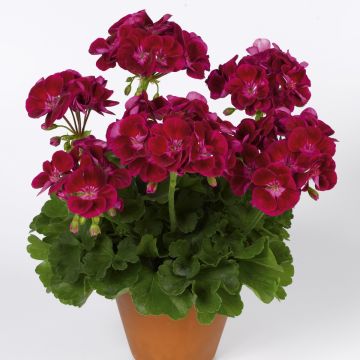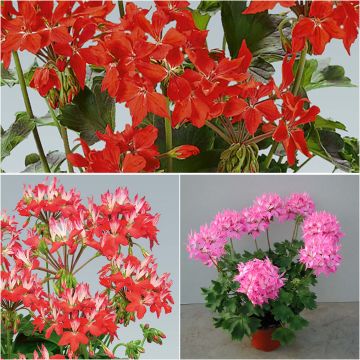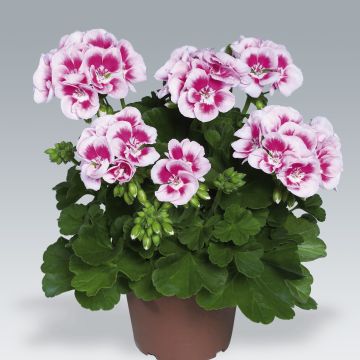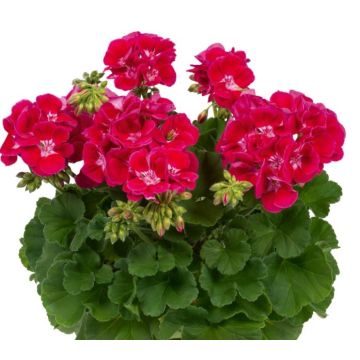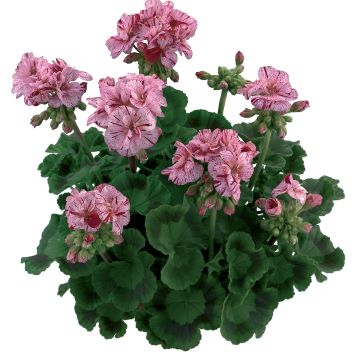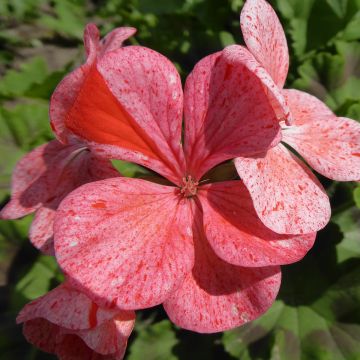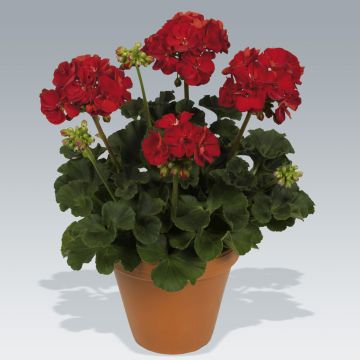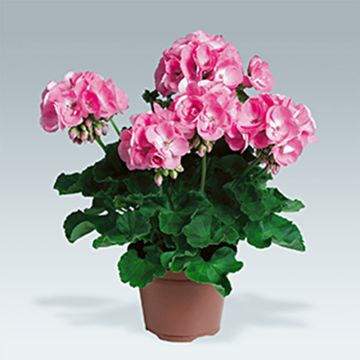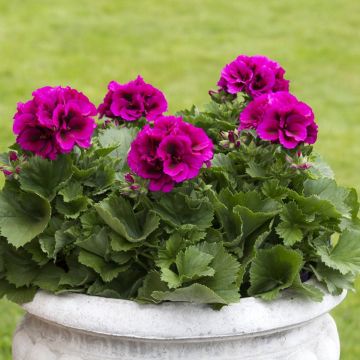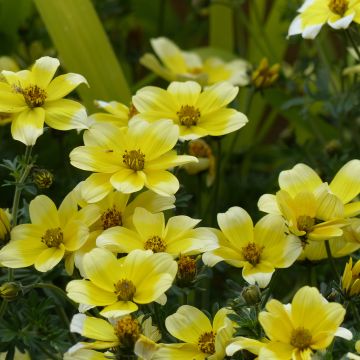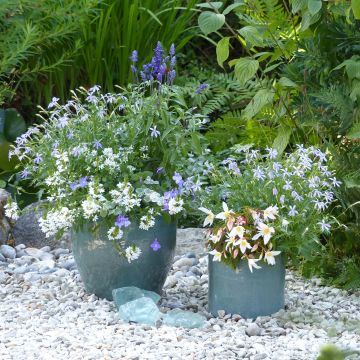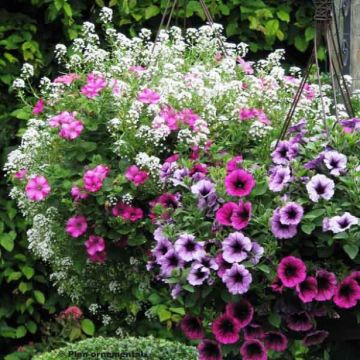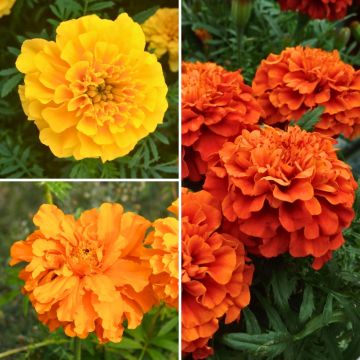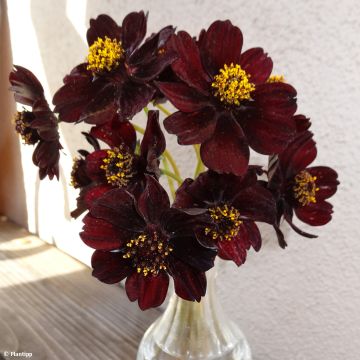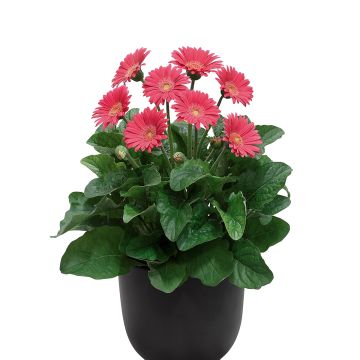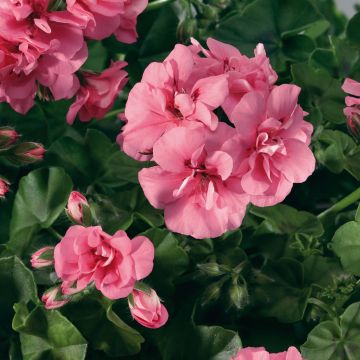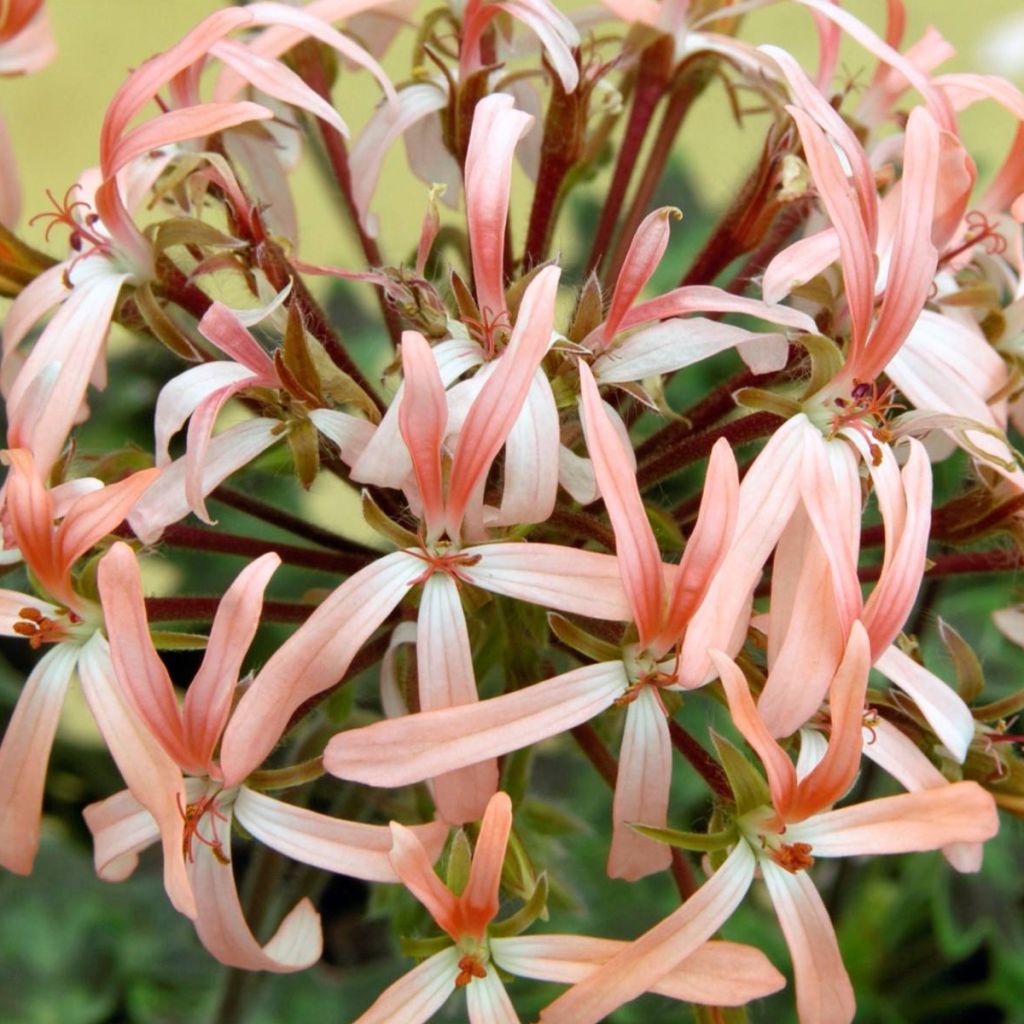

Pelargonium Stellar Bird Dancer - Géranium
Pelargonium Stella Bird Dancer
Pelargonium x hortorum Stellar Bird Dancer
Zonal geranium, Garden geranium
I received the 3 geraniums well, I planted them immediately in a large planter with fresh soil and watered them thoroughly. Currently, they look weak, as if they were thirsty, even though they are well-watered. In Alsace right now, it's very hot—they are on a balcony on the first floor. Are they getting too much sun?
élizabeth, 14/06/2025
Special offer!
Receive a €20 voucher for any order over €90 (excluding delivery costs, credit notes, and plastic-free options)!
1- Add your favorite plants to your cart.
2- Once you have reached €90, confirm your order (you can even choose the delivery date!).
3- As soon as your order is shipped, you will receive an email containing your voucher code, valid for 3 months (90 days).
Your voucher is unique and can only be used once, for any order with a minimum value of €20, excluding delivery costs.
Can be combined with other current offers, non-divisible and non-refundable.
Why not try an alternative variety in stock?
View all →This plant carries a 6 months recovery warranty
More information
We guarantee the quality of our plants for a full growing cycle, and will replace at our expense any plant that fails to recover under normal climatic and planting conditions.

Would this plant suit my garden?
Set up your Plantfit profile →
Description
Pelargonium 'Stella Bird Dancer' displays highly cut, sculptural foliage with bicolour tones, and boasts an airy and elegant flowering. This zonal geranium forms a miniature evergreen shrub with green and dark brown-purple dentate foliage. The two colours are perfectly separated and distinct. It blooms from June to September, in small umbels with thin apricot-salmon petals, carried high above the foliage by long petioles. This very pretty variety grows quickly in light and fertile soils, in full sun. It should be wintered frost-free.
Zonal pelargoniums include perennial hybrids from the geranium family, in a large group called Pelargonium x hortorum. They are mostly derived from P. inquinans, native to the southeast tip of Africa, with the contribution of P. zonale and P. frutetorum. This variety forms a small bushy clump with an upright habit, 30cm (12in) in all directions. It flowers from spring to autumn, tirelessly producing an abundance of apricot-salmon single flowers, which are grouped on a long peduncle in an umbel. They open on beautiful dark green and brown-purple foliage. Its sturdy and succulent stems bear cut leaves with toothed edges and a thick texture. The foliage is very healthy.
Once reserved for balconies and patios, pelargoniums are making a notable entrance in sunny flower beds and borders. Plant them en masse to create a lasting and cheerful decoration throughout the summer season. These plants tolerate lack of water quite well, which makes them ideal companions for garden verbenas, unusual blue lobelias, and black or purple-leaved ipomeas (Ipomoea Illusion Midnight Lace, Ipomoea Sweet Heart 'Jet Black'). Create magnificent pots and hanging baskets by combining them with bright pink or red varieties, Million Bells, variegated periwinkles, Dichondra 'Silver Falls', violets, and calibrachoas.
Report an error about the product description
Pelargonium Stella Bird Dancer in pictures
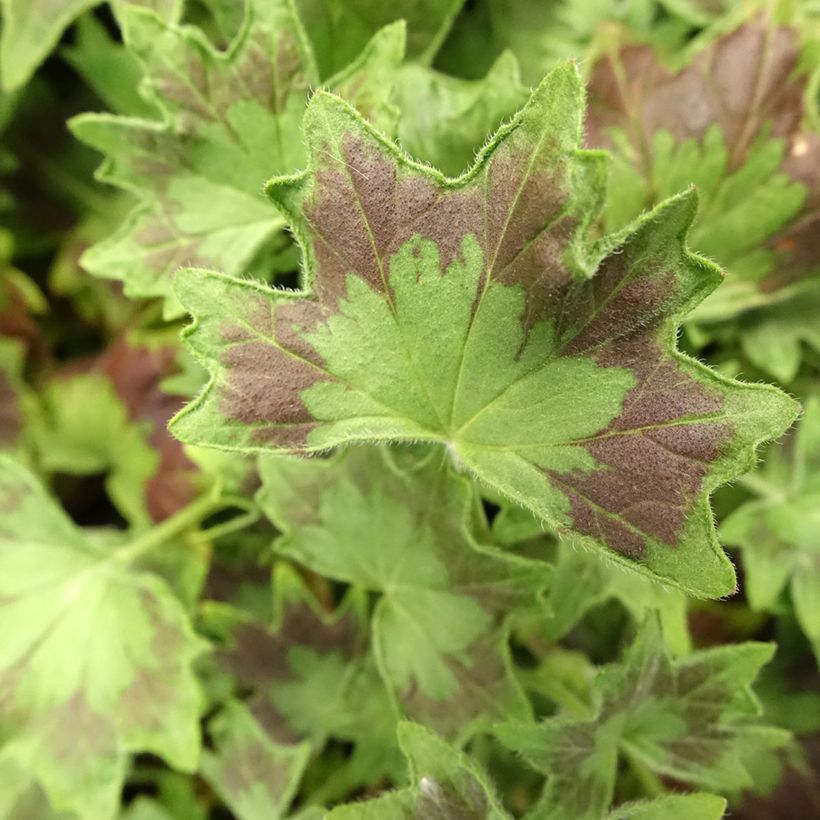

Flowering
Foliage
Plant habit
Botanical data
Pelargonium
x hortorum
Stellar Bird Dancer
Geraniaceae
Zonal geranium, Garden geranium
Cultivar or hybrid
Planting and care
Zonal geraniums thrive in fertile, well-drained, neutral to alkaline, well-loosened soils. They prefer full sun. Geraniums are hungry plants that require regular applications of fertiliser to give their best.
You can plant pelargoniums as early as March-April in mild climate regions, but they will need to be brought indoors in case of frost. To avoid any danger, wait until the risk of frost has passed before placing them outside. When planting in pots or containers, use special geranium compost.
In the garden, wait until the end of April, or even mid-May, to plant them in the ground. Add a special geranium growing support to your soil.
Planting period
Intended location
Care
-
, onOrder confirmed
Reply from on Promesse de fleurs
Similar products
Haven't found what you were looking for?
Hardiness is the lowest winter temperature a plant can endure without suffering serious damage or even dying. However, hardiness is affected by location (a sheltered area, such as a patio), protection (winter cover) and soil type (hardiness is improved by well-drained soil).

Photo Sharing Terms & Conditions
In order to encourage gardeners to interact and share their experiences, Promesse de fleurs offers various media enabling content to be uploaded onto its Site - in particular via the ‘Photo sharing’ module.
The User agrees to refrain from:
- Posting any content that is illegal, prejudicial, insulting, racist, inciteful to hatred, revisionist, contrary to public decency, that infringes on privacy or on the privacy rights of third parties, in particular the publicity rights of persons and goods, intellectual property rights, or the right to privacy.
- Submitting content on behalf of a third party;
- Impersonate the identity of a third party and/or publish any personal information about a third party;
In general, the User undertakes to refrain from any unethical behaviour.
All Content (in particular text, comments, files, images, photos, videos, creative works, etc.), which may be subject to property or intellectual property rights, image or other private rights, shall remain the property of the User, subject to the limited rights granted by the terms of the licence granted by Promesse de fleurs as stated below. Users are at liberty to publish or not to publish such Content on the Site, notably via the ‘Photo Sharing’ facility, and accept that this Content shall be made public and freely accessible, notably on the Internet.
Users further acknowledge, undertake to have ,and guarantee that they hold all necessary rights and permissions to publish such material on the Site, in particular with regard to the legislation in force pertaining to any privacy, property, intellectual property, image, or contractual rights, or rights of any other nature. By publishing such Content on the Site, Users acknowledge accepting full liability as publishers of the Content within the meaning of the law, and grant Promesse de fleurs, free of charge, an inclusive, worldwide licence for the said Content for the entire duration of its publication, including all reproduction, representation, up/downloading, displaying, performing, transmission, and storage rights.
Users also grant permission for their name to be linked to the Content and accept that this link may not always be made available.
By engaging in posting material, Users consent to their Content becoming automatically accessible on the Internet, in particular on other sites and/or blogs and/or web pages of the Promesse de fleurs site, including in particular social pages and the Promesse de fleurs catalogue.
Users may secure the removal of entrusted content free of charge by issuing a simple request via our contact form.
The flowering period indicated on our website applies to countries and regions located in USDA zone 8 (France, the United Kingdom, Ireland, the Netherlands, etc.)
It will vary according to where you live:
- In zones 9 to 10 (Italy, Spain, Greece, etc.), flowering will occur about 2 to 4 weeks earlier.
- In zones 6 to 7 (Germany, Poland, Slovenia, and lower mountainous regions), flowering will be delayed by 2 to 3 weeks.
- In zone 5 (Central Europe, Scandinavia), blooming will be delayed by 3 to 5 weeks.
In temperate climates, pruning of spring-flowering shrubs (forsythia, spireas, etc.) should be done just after flowering.
Pruning of summer-flowering shrubs (Indian Lilac, Perovskia, etc.) can be done in winter or spring.
In cold regions as well as with frost-sensitive plants, avoid pruning too early when severe frosts may still occur.
The planting period indicated on our website applies to countries and regions located in USDA zone 8 (France, United Kingdom, Ireland, Netherlands).
It will vary according to where you live:
- In Mediterranean zones (Marseille, Madrid, Milan, etc.), autumn and winter are the best planting periods.
- In continental zones (Strasbourg, Munich, Vienna, etc.), delay planting by 2 to 3 weeks in spring and bring it forward by 2 to 4 weeks in autumn.
- In mountainous regions (the Alps, Pyrenees, Carpathians, etc.), it is best to plant in late spring (May-June) or late summer (August-September).
The harvesting period indicated on our website applies to countries and regions in USDA zone 8 (France, England, Ireland, the Netherlands).
In colder areas (Scandinavia, Poland, Austria...) fruit and vegetable harvests are likely to be delayed by 3-4 weeks.
In warmer areas (Italy, Spain, Greece, etc.), harvesting will probably take place earlier, depending on weather conditions.
The sowing periods indicated on our website apply to countries and regions within USDA Zone 8 (France, UK, Ireland, Netherlands).
In colder areas (Scandinavia, Poland, Austria...), delay any outdoor sowing by 3-4 weeks, or sow under glass.
In warmer climes (Italy, Spain, Greece, etc.), bring outdoor sowing forward by a few weeks.






























